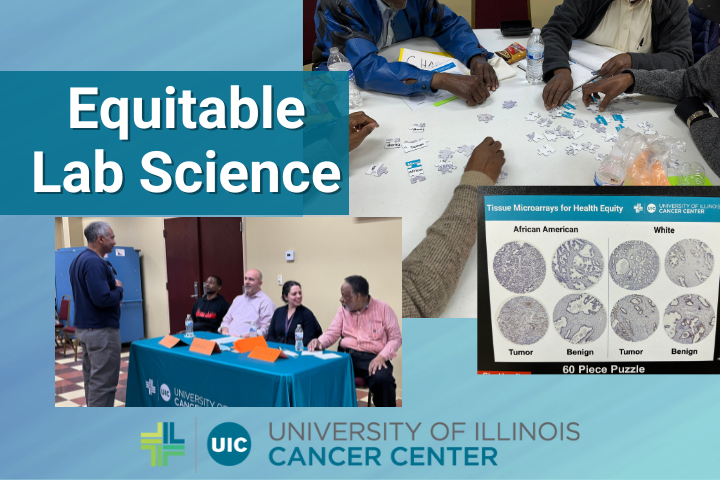
Researchers at the University of Illinois Cancer Center used jigsaw puzzles to illustrate for a group of 20 African American men how prostate cancer tumor DNA sequencing helps scientists discover what causes cancer to grow and helps physicians personalize treatment.
At the event put on by the Cancer Center’s Community Engagement and Health Equity (CEHE) Office at Compassion Baptist Church on Chicago’s far southeast side, the men spread out across five tables and each group put together a 60-piece puzzle with an image of prostate cancer tissue microarrays from African American and white men.
Disparities exist in prostate cancer with African American men more likely than others to be diagnosed and to die of the disease.
Cancer Center members Natalie Reizine, MD, and Don Vander Griend, PhD, explained how sequencing breaks DNA into lots of small pieces and, like a puzzle, those pieces are reassembled so scientists can look for pieces that are missing or don’t fit to identify gene mutations. That genetic information also helps scientists know what to target when developing new therapies.
Donated tissues from diverse populations of men are vital for prostate cancer research so scientists rely on patients and are grateful for their contributions to scientific discoveries.
During the event, the men, some of whom were prostate cancer survivors, shared their stories and encouraged other men to be screened for prostate cancer if they were hesitant to do so. A patient of Dr. Reizine, Ralph Jones, also shared a moving testimonial about living with stage 4 prostate cancer and receiving treatment at UI Health.
The community members gave valuable input for the Cancer Center members to incorporate in their science, including the role of diet and how where you work and live impacts prostate cancer cells.
